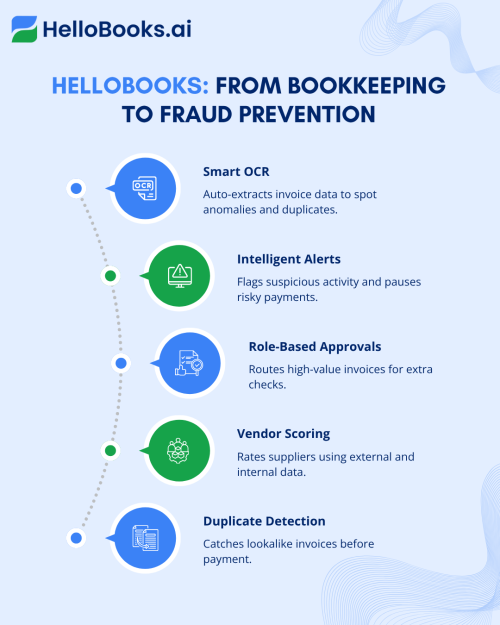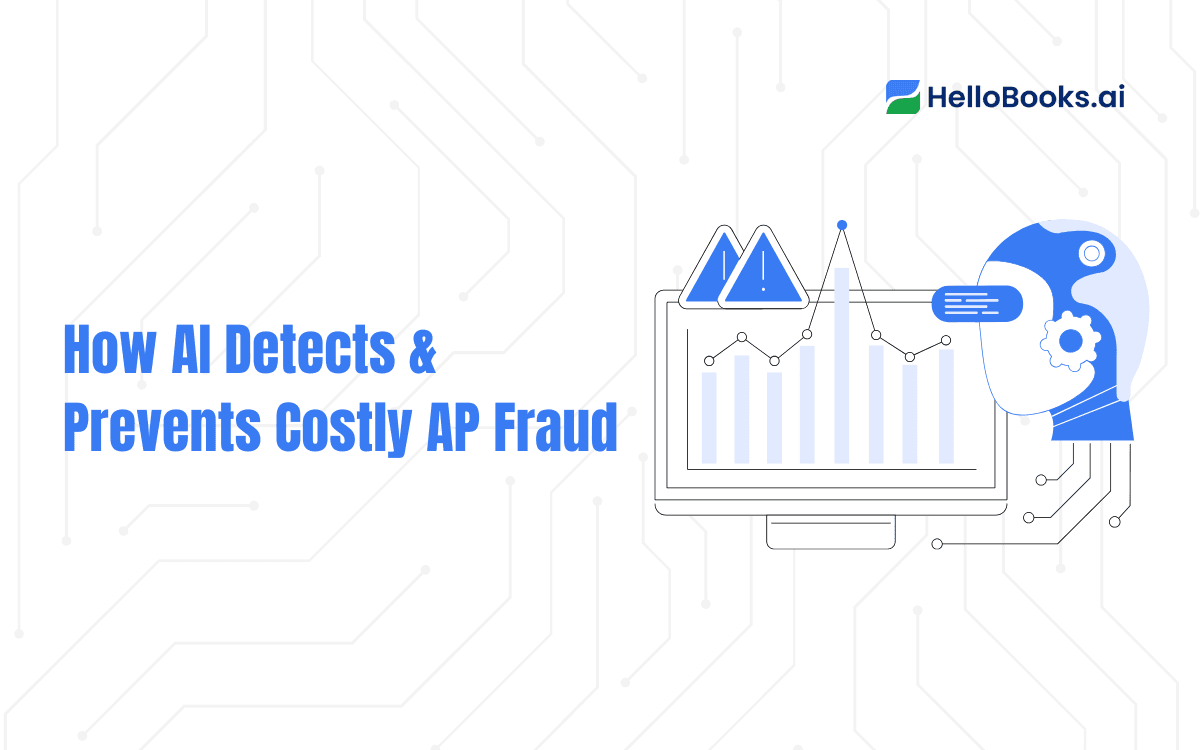How AI Detects & Prevents Costly AP Fraud — A HelloBooks Perspective
In today’s digital economy, businesses juggle ever‑increasing volumes of invoices, vendor payments, and financial workflows. While automation and scale bring efficiency, they also open the attack surface for fraudsters. For many companies, Accounts Payable (AP) fraud is among the most damaging. A single fraudulent vendor to change or duplicate payout can cost tens or even hundreds of thousands of dollars.
That’s where AI driven detection and prevention come in, and HelloBooks, as a next generation finance platform, is embedding these capabilities to safeguard businesses. In this blog, we’ll explore how AP fraud detection AI, anomaly detection in finance, duplicate payment prevention, and vendor screening work together to protect your bottom line. We’ll also illustrate how HelloBooks is building these defenses into its stack.
The Role of AI in AP Fraud Detection
Artificial intelligence (especially machine learning) brings the ability to learn patterns, detect and optimize the pattern from historical data. How AI helps in the context of AP/fraud below, its four columns are:
1. Anomaly Detection in Finance
This is the core. The AI models analyze historical payment behavior, invoices, sellers’ payment patterns, invoices, time, etc. Over time, the system learns “what is normal” for a company: specific invoice range, frequency, seller relationship, seasonal variations, etc.
Then, for each new transaction, if it is quite distracted by the learned baseline, it is marked as an anomaly. For example:
- A vendor usually gets ₹50,000 monthly; suddenly an invoice for ₹5,00,000 arrives.
- A vendor is paid twice in the same week when normally only once.
- A vendor whose account details were just changed is requesting a large payment.
Such anomalies may indicate fraud or at least warrant further human review.
Based on the HelloBooks, AI, being first, the same discrepancy under the hood can integrate engines and increase “smart alert” when something does not look right. As HelloBooks own site claims, “fraud detection built in” is part of its design.
2. Duplicate Payment Prevention
One of the most common and costly mistakes in AP is inadvertently paying the same invoice twice (or near duplicate). This may be due to:
- Slight variations in the invoice number or vendor name (typos).
- Multiple departments process the same invoice.
- A delayed invoice arrived after payment, leading to double entry.
AI helps compare new invoices to the “fingerprint” of previous challans: matching fields, volume, seller identity, line items, etc.
HelloBooks architecture (including invoice scanning, auto‑categorization, and real time approvals) provides opportunities to intercept duplicates before approval. As soon as an invoice is recorded, a duplicate detection module can compare it with the existing record and can alert the user or block the payment flow.
3. Continuous Learning & Feedback Loop
One of the main strengths of the AI system is that they continuously improve. As users confirm or dismiss the flagged alert (i.e. “yes, it was fraud” or “no, wrong alarm”), model weight updates, refines the threshold, reduces false positivity, and adapts to developing a strategy of fraud.
It also allows a feedback loop system to detect new patterns of fraud which were not seen earlier. For example, new sellers’ type, micro bank change, transfer time. Over time, the system becomes more accurate and smarter.
In short, AI based AP fraud detection is not a stable “if” rule engine; It is a dynamic, developing shield that is favorable for new hazards.
How HelloBooks Can (and Should) Leverage These Techniques
HelloBooks, as the AI‑powered bookkeeping and accounts software, has several architectural advantages to bake fraud detection into the workflow. Below are some admirable features and suggestions for growth:
1. Invoice OCR + Auto‑Extraction
HelloBooks has an AI based OCR scanner that extracts invoice fields (vendor, amounts, date, line items) and maps them into the system. Because the data arrives in structured form, it’s easier to compare incoming invoices against historical patterns for anomalies or duplicates.
2. Smart Alerts & Workflow Control
HelloBooks advertises “smart alerts for suspicious activity and pattern detection” as part of its “built in fraud detection” features. A strong UX will allow risky invoices, vendor changes, or duplicate candidates to be highlighted and payment workflows paused pending review.
3. Role Based Approvals & Multi Tier Controls
Multi level approval helps to embed the workflows (such as large invoices require additional signoffs, or seller changes require a sign off) to ensure human monitoring. HelloBooks already supports the routing approval to correct the decision makers. This risk can be associated with scoring thresholds: excessive risk invoices require additional verification automatically.
4. Vendor Risk Scoring & Screening Module
HelloBooks may integrate internal behavior to external vendor data (business directory, credit registries, KYC registries) and vendors to assign risk scores. If the risk of a seller is more than the limit, new invoices or change requests can be marked or rejected.
5. Duplicate & Fuzzy Matching Engine
A module running behind the curtain to catch the exact and fuzzy duplicates (naming types, variants) can prevent dual payment. If a suspicious match is found, the system may motivate the user to confirm before proceeding.
By combining these elements, HelloBooks can evolve from simply being a bookkeeping tool into a finance guardrail ensuring that businesses grow without fear of internal or external fraud leakage.
Benefits, Challenges & Best Practices
Benefits
- Low financial loss: Even preventing a successful fraud incident can be higher than justifying investment in detection.
- Operations efficiency: AI filters noise, allowing finance teams to focus on real alerts rather than transferred through false positivity.
- Scalability: As the invoice volumes grow, the AI scale is better than manual reviews.
- Strong Audit Trail: Every alert, decision, and override logged compliance, improving transparency.
Challenges & Caveats
- False positive: highly sensitive models can mark valid invoices. This disappoints users. A good system should allow override and feedback loops.
- Cold Start Problem: New outfits may initially have a lack of adequate data to train strong models.
- Integration complexity: AI fraud engine will have to integrate with ERP, payment system, bank accounts and existing workflows.
Best Practices
- Start small, pilot mode: initially detect AI fraud in “monitor only” mode, allow the model to learn, fine tune threshold, and evaluate false positivity.
- Human in loop: always allow human overrides and reviews, especially in early stages.
- Response flow: capture user reactions (fraud / no fraud) to refine the model.
- Clarity: The surface “reason” for the flag e.g. “Invoices are 10× larger than the 95th percentile for this vendor,” or “Vendor bank account recently changed.”
- Regular retraining: Retraining the model periodically to adapt to new invoice patterns.
Conclusion: A Safer AP Journey with HelloBooks
AP fraud is a silent and destructive risk. As a scale of businesses, the surface of fraud increases but AI gives us a defensive muscle to fight back. AP fraud detection AI, anomaly detection in finance, duplicate payment prevention, and seller screening in their architecture. HelloBooks has the ability to replace “just one accounting tool” in a strategic protector of financial integrity.
For users of HelloBooks, this means:
- Catching fraud before it happens, not after.
- Reducing manual toil and letting finance teams focus on value.
- Trusting that every vendor, invoice, and payment is scrutinized by intelligent, evolving systems.
If you use HelloBooks (or are considering it), you can ask:
- Are there currently system inconsistencies or vendor changes?
- Are there any duplicate payment checks or fuzzy matching?
- Can the seller include external screening?
- Is there a reaction loop to refine the flag over time?
When these features are fully realized, HelloBooks not only helps you automate bookkeeping, but it becomes your silent fraud guard.

